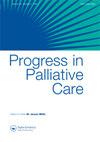探索意识,知识和看法的临终关怀在加拿大人口
IF 0.8
Q4 PUBLIC, ENVIRONMENTAL & OCCUPATIONAL HEALTH
引用次数: 0
摘要
本文章由计算机程序翻译,如有差异,请以英文原文为准。
Exploring the awareness, knowledge and perceptions of palliative care at end-of-life in a Canadian population
Background The role of palliative care (PC) in chronic disease and end-of-life (EOL) management is rapidly evolving. However, studies globally have demonstrated limited public knowledge and awareness of PC with several misconceptions. Objective The purpose was to expand upon previous Canadian studies by providing more current and detailed information about the awareness, knowledge and perceptions of PC in EOL management. Additionally, the reliability of self-reported PC knowledge was explored. Methods A cross-sectional study using an 8-item questionnaire was conducted at an urban medical centre with 100 adults. Descriptive statistics and Chi-square tests were used for analyses. Results Ninety-one participants had heard of PC, while 58 reported being knowledgeable of PC services. Females were significantly more knowledgeable than males (p < 0.05). Most participants knew that PC improves a patient’s quality of life (n = 71), would not shorten life in a dying individual (n = 71) and can be provided in locations outside of the hospital (n = 72). Many indicated that involving PC services would not make them feel like they were giving up hope. There was less awareness around when to involve PC services, as there were mixed answers to whether PC is only needed if someone is dying from an illness. Two-thirds of participants who reported being knowledgeable of PC answered at least 75% of questions correctly. Conclusion Participants were quite aware and knowledgeable of PC but would benefit from education about the PC role in both chronic disease and EOL management. Self-reported knowledge was a fairly reliable indicator of true knowledge in this study.
求助全文
通过发布文献求助,成功后即可免费获取论文全文。
去求助
来源期刊

PROGRESS IN PALLIATIVE CARE
PUBLIC, ENVIRONMENTAL & OCCUPATIONAL HEALTH-
CiteScore
2.60
自引率
11.80%
发文量
24
期刊介绍:
Progress in Palliative Care is a peer reviewed, multidisciplinary journal with an international perspective. It provides a central point of reference for all members of the palliative care community: medical consultants, nurses, hospital support teams, home care teams, hospice directors and administrators, pain centre staff, social workers, chaplains, counsellors, information staff, paramedical staff and self-help groups. The emphasis of the journal is on the rapid exchange of information amongst those working in palliative care. Progress in Palliative Care embraces all aspects of the management of the problems of end-stage disease.
 求助内容:
求助内容: 应助结果提醒方式:
应助结果提醒方式:


